
October 6
1683 German immigrants found the Pennsylvania Colony of Germantown, the first permanent German settlement in North America. [For further details, Click here]
1849 Birth: Sir Basil Zaharoff: arms dealer.
1908 Austria annexes Bosnia and Herzegovina:
On October 6, 1908, the Dual Monarchy of Austria-Hungary announces its annexation of Bosnia and Herzegovina, dual provinces in the Balkan region of Europe formerly under the control of the Ottoman Empire.
Though Bosnia and Herzegovina were still nominally under the control of the Ottoman Sultan in 1908, Austria-Hungary had administered the provinces since the Congress of Berlin in 1878, when the great powers of Europe awarded the Dual Monarchy the right to occupy the two provinces, with the legal title to remain with Turkey. As the provinces were coveted by many—in fact, both Austria and Hungary wanted Bosnia and Herzegovina for themselves—the decision was more or less a stopgap to preserve the delicate balance of power in Europe. To make matters more complicated, the largely Slavic population of the two provinces had nationalist ambitions of their own, while their fellow Slavs in nearby Serbia yearned to annex them to further their pan-Slavic ambitions.
When rebellion by the Committee of Union and Progress—the so-called Young Turks—took the Ottoman government by storm in 1908, Baron Aloys von Aerenthal, foreign minister of Austria-Hungary, saw his empire's chance to assert its dominance in the Balkans. Aside from the sultan's weakness, Russia, the Dual Monarchy's great rival for power in the Balkans, was also reeling, after a defeat in the Russo-Japanese War and internal revolution in 1905.
The announcement in October 1908 of Austria-Hungary's annexation of Bosnia and Herzegovina upset the fragile balance of power in the Balkans, enraging Serbia and pan-Slavic nationalists throughout Europe. Though weakened Russia was forced to submit, to its humiliation, its foreign office still viewed Austria-Hungary's actions as overly aggressive and threatening, despite Aerenthal's assurances that he did not plan to take Macedonia, another disputed former Ottoman province, next. Russia's response was to encourage pro-Russian, anti-Austrian sentiment in Serbia and other Balkan provinces, provoking Austrian fears of Slavic expansionism in the region.
In January 1909, at the height of the Bosnia-Herzogovina crisis, Franz Conrad von Hotzendorff, the chief of staff of the Austrian army, approached Helmuth von Moltke, his German counterpart, to ask what Germany would do if Austria invaded Serbia and thus provoked Russia to intervene on the latter's behalf. Significantly, Moltke replied that—despite the purely defensive nature of their earlier alliance, concluded in 1879—Germany would back Austria-Hungary, even if it was the aggressor in such a conflict, and would not only go to war against Russia, but also against France, Russia's powerful ally in the west. In the summer of 1914, it would do just that, as the struggle for power in the tumultuous Balkans morphed into the devastating international conflict that would become known as the First World War. (History.com)
[See: Austria: The Other Germany.]1914 List Regiment (Sep 1-Oct 7):
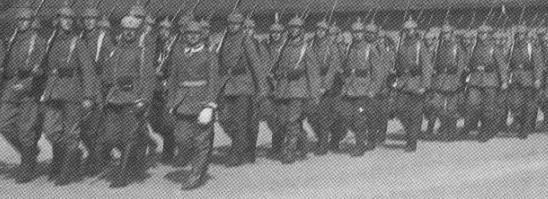
Infantry recruit Adolf Hitler's regiment continues their short but intensive basic training program, which is held in the premises of a large public school on the Elizabeth Platz in Munich. Hitler receives the first uniform of his life; basic greenish-grey with an "RIR 16" sown in red unto the epaulettes and a red stripe down the side of the trousers. The trousers are tucked into new leather boots, topped by a thick leather belt around the waist of the uniform jacket. [For further details, Click here.]
1915 World War I: Various:
Russia's Declaration of War on Bulgaria:
Declare to all Our loyal subjects: Impossible as it seemed, but treacherously preparing from the very beginning of the war, Bulgaria has betrayed the Slav cause: The Bulgarian army has attacked Our faithful ally Serbia, bleeding profusely in a struggle with a strong enemy. Russia and Our allied Great Powers tried to warn Ferdinand of Coburg against this fatal step. The fulfilment of an age-old aspiration of the Bulgar people--union with Macedonia--has been guaranteed to Bulgaria by a means more in accord with the interests of the Slav world. But appeals by the Germans to secret ambitions and fratricidal enmity against the Serbs prevailed. Bulgaria, whose faith is the same as Ours, who so recently has been liberated from Turkish slavery by the brotherly love and the blood of the Russian people, openly took the side of the enemies of the Christian faith, the Slav world and of Russia. The Russian people react with bitterness to the treachery of a Bulgaria which was so close to them until recently, and draw their swords against her with heavy hearts, leaving the fate of these traitors to the Slav world to God's just retribution. Given at the Tsar's Headquarters the 5th day of October, in the year from the Nativity of Christ the 1,915th, and of Our reign the twenty-first. On the true authority of His Imperial Majesty.
From an account of The Fall of Serbia by General von Cramon:
The Bulgarians drew up on the western frontier of their country. Czar Ferdinand had stipulated that he was not to move forward until several days after our own advance. He wanted absolute security. Nevertheless, the turn in the policy of Bulgaria could not remain unknown to the Entente. Russia sent an ultimatum on October 3rd to which Bulgaria replied "in unsatisfactory form" three days later; whereupon the quadruple alliance severed its relations with the government at Sofia. On October 6th the German and Austrian troops of Mackensen crossed the Danube. While the Austrian battalions fastened themselves upon the northern edge of Belgrade, the 22nd Reserve Corps of the Germans forced its way through west of the city and compelled the enemy to evacuate the place. The Serbians offered an obstinate resistance, but could not arrest our advance.
1915 List Regiment:

Gefreiter Adolf Hitler's 16 Reserve Infantry Regiment continues to occupy a position at Fromelles—pictured above in a drawing by Hitler—on a level field with water channels, willow trees and willow stalks. In the distance towards the enemy lines lies an insignificant wood with barbed wire entanglements. Under the direction of their defense-minded commander, Lieutenant General Gustav Scanzoni von Lichtenfels, the regiment works ceaselessly day and night to further fortify their position at Fromelles while fighting off repeated assaults by the enemy. [For further details, Click here.]
1916 World War I: List Regiment:
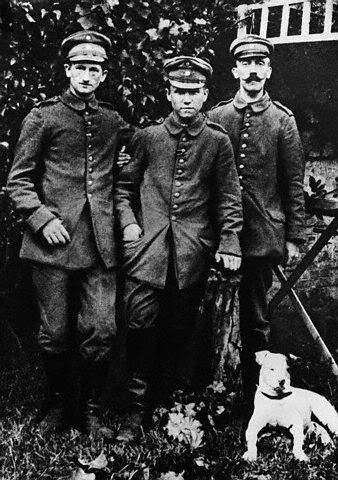
Schmidt, Amann, Hitler, Fuchsl]
The 16th RIR occupies a series of primitive trenches on the Somme Front. [For further details, Click here.]
1917 World War I (Sep 30-Oct 17):
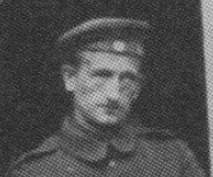
Hitler takes an eighteen-day furlough to accompany Schmidt [above] on a visit to his sister in Dresden with him. After sightseeing stops at Brussels and Cologne, they hit Leipzig, a city Hitler especially enjoys. He is impressed by the 300-foot tall monument, Battle of the Nations, honoring the war-dead of 1812. "This has nothing to do with art," he tells Schmidt (above), "but it is enormous and beautiful." After spending some time with Schmidt in Dresden, Hitler goes off by himself to Berlin to spend a few days with yet another front-line comrade. In a postcard to Schmidt, he writes: "The city is marvelous. A real world capital. Traffic is still tremendous. Am gone almost all day. Now finally have opportunity to study the museums a little better. In short: there is nothing lacking." [For further details, Click here.]
1918 World War I: Various:
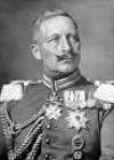
Kaiser Wilhelm II's Proclamation to the Army:
For months past the enemy, with enormous exertions and almost without pause in the fighting, has stormed against your lines. In weeks of the struggle, often without repose, you have had to persevere and resist a numerically far superior enemy. Therein lies the greatness of the task which has been set for you and which you are fulfilling. Troops of all the German States are doing their part and are heroically defending the Fatherland on foreign soil. Hard is the task. My navy is holding its own against the united enemy naval forces and is unwaveringly supporting the army in its difficult struggle. The eyes of those at home rest with pride and admiration on the deeds of the army and navy. I express to you the thanks of myself and the Fatherland. The collapse of the Macedonian front has occurred in the midst of the hardest struggle. In accord with our allies, I have resolved once more to offer peace to the enemy, but I will only extend my hand for an honourable peace. We owe that to the heroes who have laid down their lives for the Fatherland, and we make that our duty to our children. Whether arms will be lowered still is a question. Until then we must not slacken. We must, as hitherto, exert all our strength tirelessly to hold our ground against the onslaught of our enemies. The hour is grave, but, trusting in your strength and in God's gracious help, we feel ourselves to be strong enough to defend our beloved Fatherland.
Armistice negotiations:
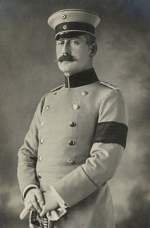
The new German Chancellor, Prince Max von Baden, sends a message to President Wilson, requesting an armistice based on Wilson's Fourteen Points. By October, it was evident that Germany could no longer mount a successful defence. They were increasingly outnumbered, with few new recruits. Rations were cut. Ludendorff decided, on 1 October, that Germany had two ways out: total annihilation or an armistice. He recommended the latter at a summit of senior German officials. Allied pressure did not let up.
Meanwhile, news of Germany's impending military defeat spread throughout the German armed forces. The threat of mutiny was rife. Admiral Reinhard Scheer and Ludendorff decided to launch a last attempt to restore the "valour" of the German Navy. Knowing the government of Max von Baden would veto any such action, Ludendorff decided not to inform him. Nonetheless, word of the impending assault reached sailors at Kiel. Many rebelled and were arrested, refusing to be part of a naval offensive which they believed to be suicidal. Ludendorff took the blame: the Kaiser dismissed him on 26 October. The collapse of the Balkans meant that Germany was about to lose its main supplies of oil and food. The reserves had been used up, but U.S. troops kept arriving at the rate of 10,000 per day.
Having suffered over 6 million casualties, Germany moved toward peace. Prince Max von Baden took charge of a new government as Chancellor of Germany to negotiate with the Allies. Negotiations with President Wilson began immediately, in the vain hope that better terms would be offered than with the British and French. Instead Wilson demanded the abdication of the Kaiser. There was no resistance when the social democrat Philipp Scheidemann on 9 November declared Germany to be a republic.
Further Details: Click Here.
List Regiment (Sep 28-Oct 15):
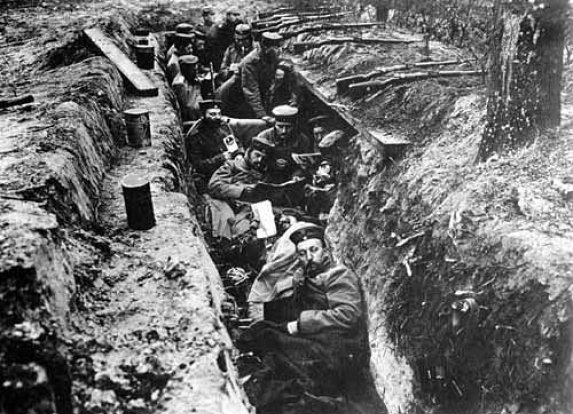
Gefreiter Adolf Hitler participates in defensive operations in Flanders with 3 Company, 16 Bavarian Reserve Infantry Regiment. [For further details, Click here.]
1935 Holocaust: Nazis stage anti-Jewish actions throughout Germany. (THP)
1937 Far East:: From a US State Department Press Release: "In the light of the unfolding developments in the Far East, the Government of the United States has been forced to the conclusion that the action of Japan in China is inconsistent with the principles which should govern the relationships between nations."
[See: Countdown to Infamy: Timeline to Pearl Harbor.]1939 World War II: Various:
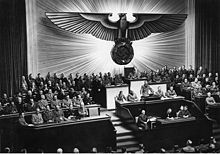
Hitler calls for a new European conference to end the war, and to settle Germany's differences with England and France. Hitler declares to the Reichstag that Germany has "no further claims against France," and adds, "Nowhere have I ever acted against British interests.
Poland: The last Polish units surrender after a two-day battle against Soviet tanks and planes that were joined by German units, followed by a five-day fight against the Germans. The Poles surrender due to lack of supplies. For some Poles, soldiers and civilians, their last battles are against Ukrainian, Byelorussian and Jewish militias and robbers, as well as German Fifth Columnists.
[See: Was Adolf Hitler 'Forced' Into the War?]
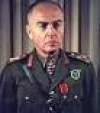
1940 World War II: Ion Antonescu assumes command of the Iron Guard, strengthening his position in Romania.
1941 World War II: Barbarossa: German troops renew their offensive against Moscow.
[See: What Were Adolf Hitler's Major Blunders?]1942 Various:
Church and Reich: Tittmann reports to the State Department that the Pope's silence is due in part to the desire of the Holy See to assure that Papal pronouncements stand the test of time and that that the Pope has hesitated to condemn German atrocities because he does not want to incur later the reproach of the German people that the Catholic Church had contributed to their defeat. (THP)
World War II: Caucasus: III Panzerkorps (von Mackensen) captures Malgobek in the bend of the Terek river. Note: Malgobek was founded in 1935 as a settlement for workers at the recently discovered oilfields nearby.
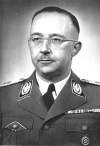
1943 Holocaust: Himmler tells a group of Gauleiters and Reichsleiters that " The Jews must disappear from the face of the earth," and that even the children must die so that they can never grow-up to seek revenge.
1944 World War II: Various:
The Red Army launches an offensive near Arad in Hungary:
In light of the worsening military situation and facing threats (from Allied leaders) of war crimes trials, Horthy ordered a halt to the deportations on July 7, 1944. In August, he dismissed the Sztojay government and resumed efforts to reach an armistice, this time with the Soviet Union whose army was on Hungary's borders. Horthy had begun final negotiations with the Soviet army.
FDR to Churchill:

I appreciate your report on the Italian campaign, where, up to the present, our combined effort has cost us nearly 200,000 casualties, 90,000 of them American. My Chiefs of Staff accept Wilson's estimate that we cannot expect to destroy Kesselring's army this winter and that the terrain and weather conditions in the Po valley will prevent any decisive advance this year. They further consider that the Germans are free to transfer five or six divisions from Italy to the Western Front whenever they consider such action more profitable than using these divisions in containing our forces south of the Po. Provision of additional US divisions will not affect the campaign in Italy this year.
All of us are now faced with an unanticipated shortage of man-power, and overshadowing all other military problems is the need for quick provision of fresh troops to reinforce Eisenhower in his battle to break into Germany and end the European war. While the divisions in Italy are undoubtedly tiring as a result of fighting in the present battle since August 25, Eisenhower is now fighting the decisive battle of Germany with divisions which have been in continuous combat since they landed on the Normandy beaches in the first part of June. The need for building up additional divisions on the long front from Switzerland to the North Sea is urgent.
Even more urgent is the need for fresh troops to enable Eisenhower to give some rest to our front-line soldiers, who have been the spear-point of the battle since the first days in Normandy. On the basis of General Marshall's reports on the present situation we are now taking the very drastic step of sending the infantry regiments of the divisions ahead of the other units in order that General Eisenhower may be able to rotate some of our exhausted front-line soldiers. Diversion of any forces to Italy would withhold from France vitally needed fresh troops, while committing such forces to the high attrition of an indecisive winter campaign in Northern Italy.
I appreciate the hard and difficult task which our armies in Italy have faced and will face, but we cannot withhold from the main effort forces which are needed in the Battle of Germany. From General Marshall's reports on the problem now facing General Eisenhower, I am sure that both of them will agree with my conviction that no divisions should be diverted from their destination in France.
1945 Pierre Laval attempts suicide:
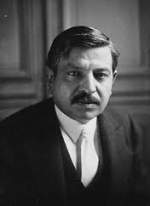
On this day in 1945, former French premier and Vichy collaborator Pierre Laval tries to kill himself on the day he is to be executed for treason. He fails.
Laval served as premier of France twice, the second time from June 1935 to January 1936, but fell from power primarily because of his appeasement of Italy after the invasion and occupation of Ethiopio by Mussolini and his fascist regime in 1935. Upon the German invasion of France in 1940, Laval, ever the opportunist, saw a chance to re-establish himself in office by supporting a puppet government headed by Henri Philippe Petain, who, when he acceded to the position of premier in June 1940, rewarded Laval by making him deputy head of state and foreign minister.
Laval was always more slavish in his devotion to his German masters than was Petain; for example, Laval began secret negotiations for a formal collaboration with Germany, convinced that the future lay in the hands of the Axis power. Petain finally fired him in December 1940. But the Germans questioned Petain's double loyalty and pressured him to reinstate Laval. Petain fell further from German favor, and when Hitler's forces occupied France in 1942, Laval, wanting to reassure Germany of his loyalty, began sending French workers to Germany and stripping French Jews of their rights. He also helped the Nazis capture and deport non-French Jews. He openly announced that he wished for a German victory. "An American victory would mean victory for the Jews and the communists."
As the end for Hitler grew near, Laval fled first to Germany, then to Spain, then to Austria, where he was arrested and sent back to France and was tried, along with Petain, on the charge of treason. Laval defended his actions, believing he had done nothing wrong. He was sentenced to be shot by firing squad on October 6, 1945, but swallowed cyanide before they could come for him. A physician saved his life: just in time for Laval to be executed a little less than two weeks later. (History.com)
1949 Tokyo Rose (Iva Toguri D'Aquino):
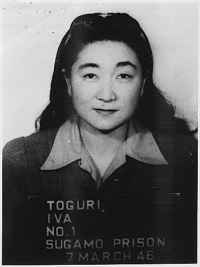
Tokyo Rose, who broadcastws Japanese propaganda to US forces in the Pacific during World War II, is sentenced in San Francisco to 10 years imprisonment and fined $10,000 on treason charges.
1961 Cold War: Kennedy urges Americans to build bomb shelters:
President John F. Kennedy, speaking on civil defense, advises American families to build bomb shelters to protect them from atomic fallout in the event of a nuclear exchange with the Soviet Union. Kennedy also assured the public that the U.S. civil defense program would soon begin providing such protection for every American. Only one year later, true to Kennedy’s fears, the world hovered on the brink of full-scale nuclear war when the Cuban Missile Crisis erupted over the USSR’s placement of nuclear missiles in Cuba. During the tense 13-day crisis, some Americans prepared for nuclear war by buying up canned goods and completing last-minute work on their backyard bomb shelters. (History.com)
1973 Yom Kippur War brings USA and USSR to brink of conflict:
The surprise attack by Egyptian and Syrian forces on Israel in October 1973 throws the Middle East into turmoil and threatens to bring the United States and the Soviet Union into direct conflict for the first time since the Cuban Missile Crisis in 1962. Though actual combat did not break out between the two nations, the events surrounding the Yom Kippur War seriously damaged U.S.-Soviet relations and all but destroyed President Richard Nixon's much publicized policy of detente. [For further information, click here.]
1981 The president of Egypt is assassinated:
Islamic extremists assassinate Anwar Sadat, the president of Egypt, as he reviews troops on the anniversary of the Yom Kippur War. Led by Khaled el Islambouli, a lieutenant in the Egyptian army with connections to the terrorist group Takfir Wal-Hajira, the terrorists, all wearing army uniforms, stopped in front of the reviewing stand and fired shots and threw grenades into a crowd of Egyptian government officials. Sadat, who was shot four times, died two hours later. Ten other people also died in the attack.
Despite Sadat's incredible public service record for Egypt (he was instrumental in winning the nation its independence and democratizing it), his controversial peace negotiation with Israel in 1977-78, for which he and Menachem Begin won the Nobel Peace Prize, made him a target of Islamic extremists across the Middle East. Sadat had also angered many by allowing the ailing Shah of Iran to die in Egypt rather than be returned to Iran to stand trial for his crimes against the country. [For further information, click here.]
Edited by Levi Bookin (Copy editor)
levi.bookin@gmail.com



Click to join 3rdReichStudies



Disclaimer: This site includes diverse and controversial materials--such as excerpts from the writings of racists and anti-Semites--so that its readers can learn the nature and extent of hate and anti-Semitic discourse. It is our sincere belief that only the informed citizen can prevail over the ignorance of Racialist "thought." Far from approving these writings, this site condemns racism in all of its forms and manifestations.
Fair Use Notice: This site may contain copyrighted material the use of which has not always been specifically authorized by the copyright owner. We are making such material available in our efforts to advance understanding of historical, political, human rights, economic, democracy, scientific, environmental, and social justice issues, etc. We believe this constitutes a "fair use" of any such copyrighted material as provided for in section 107 of the US Copyright Law. In accordance with Title 17 U.S.C. Section 107, the material on this site is distributed without profit to those who have expressed a prior interest in receiving the included information for research and educational purposes. If you wish to use copyrighted material from this site for purposes of your own that go beyond 'fair use', you must obtain permission from the copyright owner.
Please Note: The list-owner and moderators of 3rdReichStudies are not responsible for, and do not necessarily approve of, the random ads placed on our pages by our web server. They are, unfortunately, the price one pays for a 'free' website.